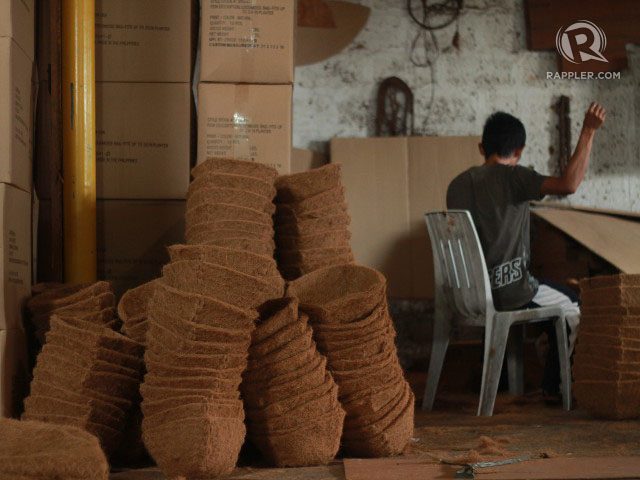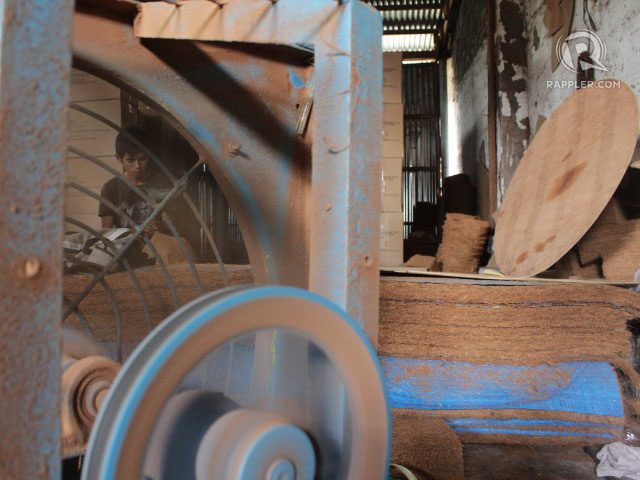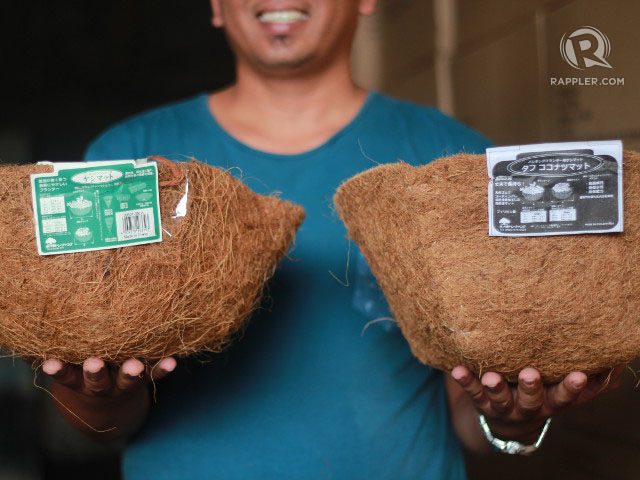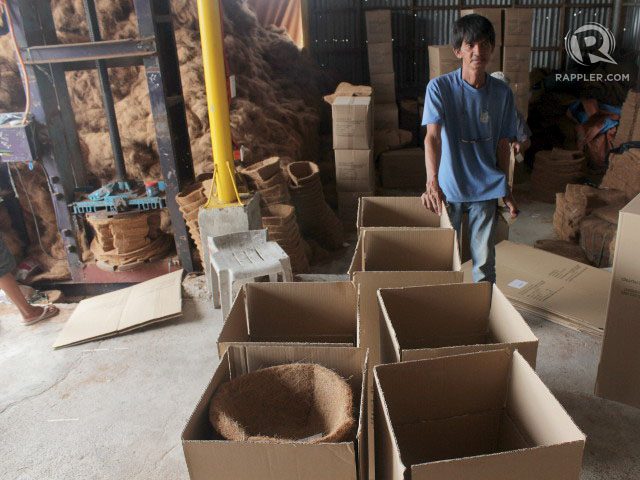SUMMARY
This is AI generated summarization, which may have errors. For context, always refer to the full article.

LAGUNA, Philippines – If you are in California and you see nurseries that sell planter baskets lined with brown matting, chances are the mattings are made in a small factory in San Pablo City in Laguna.
The matting is popularly known as coco moss in Western markets. It is made of coconut husks, a by-product that is either burned or left unused by many Filipino farmers engaged in copra production. But not in this factory 3 hours away from Manila, said Maria Teresa Diokno-Pascual.
Pascual is the CEO of Pilipinas Ecofiber Corporation (PEC), which operates the Laguna coconut fiber-processing plant, apart from its factories in Quezon and Albay provinces.

At their plants, the husks are pummeled in a machine to separate the fiber and the pith.
The coconut’s pith is an alternative to peat, and when mixed with soil, helps plants to root stronger on the ground.
On the other hand, the fibers are combed and twisted into yarns, and wound into bundles that would then be called coco moss.
These processes require teams of workers to complete. In the case of PEC, the workers are comprised of associations of coconut farmers who, many of them, once knew nothing beyond producing copra – and burning all that is left behind.
“Many farmers are stuck with the copra business industry, and it’s keeping the farmers poor,” said Pascual, who manages the PEC for 7 years now.

Coir’s gaining popularity
The importance of coco coir both as a locally traded and an exported product is gradually gaining popularity in the Philippines.
Property developers and infrastructure contractors in the country buy them to block soil erosion and fix roads.
As the demand for these products increase, the PEC booked P25 million ($558,301.75*) worth of sales in 2013.

Pascual, known as Maitet among her colleagues, cringed when asked on the origins of PCE, a subsidiary of the Foundation for a Sustainable Society (FSSI) since 2006.
The FSSI, whose portfolio contains social entrepreneurship projects, acquired PEC which was then called Soriano Multipurpose Fiber Corporation.
Established in 1975 by now 87-year-old Francisco Soriano, the company was a big exporter of coconut products and by-products until the 1991 Gulf War, when freight costs went steep to cover risks involved in shipping goods overseas.
For the first few years of its operation as an FSSI subsidiary, it had negative cash flows, servicing debts
“It’s FSSI’s special child,” Pascual described PEC.
A special child, because it bills itself as a social enterprise – but had to go through a transition before it could be called one: from a company that’s purely concerned with profits, and treated the workers as wage earners.
“In provinces, the owner is seen as a patron. They even see me as ‘Ma’am Maitet,’ rather than seeing themselves as co-owners in this venture,” she lamented.
Transitioning to social enterprise
Such mindset among workers is not an isolated case. Feudal economic relations between coconut farmers and landlords still remains evident despite a long history to reform land ownership in the Philippines.
The globally recognized term “coir” originated from a Malayalam word kayar, which tells a lot why South Asia economies India and Sri Lanka are the world’s biggest exporters of the product, while the Philippines is playing catch up.
This, along with competition with other local coir producers, makes an attempt to widen profit margins difficult.
“Which could be one of the reasons why they don’t see themselves as shareholders in this enterprise,” explained Pascual, who holds a graudate degree in Economics from the London School of Economics and Political Science.
As non-government organizations express a positive outlook for social entrepreneurship in the Philippines, social enterprises themselves are at the front line, giving their best shot to make it work.
This 24-member association earns between P19,000 ($424.31) and P30,000 ($669.96) a week. Still a meager amount, but this time, the members avail of mandatory employment benefits such as health insurance and social security, Pascual said.
“It’s something they have not enjoyed before,” she said.
Social entrepreneurship – businesses of traditional capitalism models but with solutions that seek to address long-term solutions – has covered at least 2.5 million people in the Philippines, according to an Oxfam UK-commissioned study.
The figure, while more than half of the count of 4.2 million poor Filipinos in 2012, could still double if government lends a hand in nurturing it, said Marie Lisa Dacanay, the study’s main researcher.
Initiatives like this could have been given a boost, but bills that would provide a backbone for social entrepreneurship are still pending in both houses of the Congress.
The measures proposed tax incentives and for the creation of a National Center for Social Enterprise Development, which would provide capacity training and education. – Rappler.com
*$1=$44.78
Add a comment
How does this make you feel?
There are no comments yet. Add your comment to start the conversation.